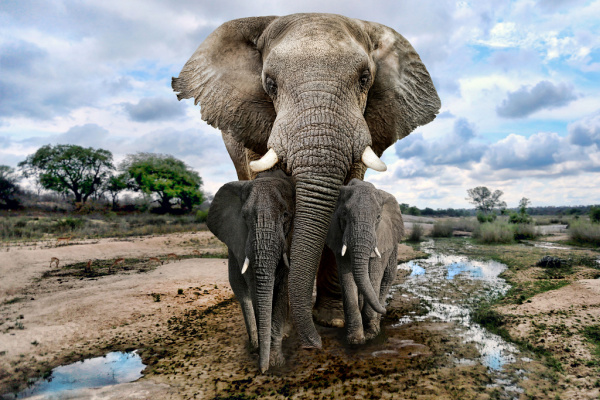African elephants use “names” to communicate with each other in the same way that humans do, researchers have discovered.
As Newsweek reports, a new study, carried out by Colorado State University scientists who analyzed hundreds of elephant calls, found that wild African Savannah elephants address each other using personalized sounds, instead of relying on the imitation of noises made by others.
This suggests that they recognize individual calls addressed to them, which is rare among animals. “Dolphins and parrots call one another by ‘name’ by imitating the signature call of the addressee,” lead author Michael Pardo said in a statement. “By contrast, our data suggest that elephants do not rely on imitation of the receiver’s calls to address one another, which is more similar to the way in which human names work.”
For the study, published in the journal Nature Ecology and Evolution, researchers recorded 469 calls–known as rumbles–made by groups of elephants and their offspring. The animals were recorded at the Amboseli National Park and the Samburu and Buffalo Springs National Reserves in Kenya between 1986 and 2022.
The scientists then used artificial intelligence technology to analyze these recordings and identify unique “names” within the calls. To test their theory that the animals use these name-like sounds to address each other, the scientists played the elephants recordings that included these names.
Elephants were seen to respond positively to calls that were addressed to them by calling back or approaching the speaker more quickly. In contrast, elephants who were not being called by their name did not react as enthusiastically. This suggests that elephant calls do indeed contain a name-like component to specify who they are communicating with.
Intriguingly, the elephants did not always address each other by name in conversation. Instead, they were more likely to use names when communicating over long distances, or when adults were talking to calves.
The ability to learn to produce new sounds, which is necessary for identifying individuals by name, is very rare among animals. This kind of communication–called “arbitrary communication”–is thought to represent higher cognitive ability. According to the researchers, this behavior may mean elephants are capable of abstract thought, which is the ability to consider concepts beyond what we observe physically. This is required for analyzing ideas and problem-solving.
However, speaking to Newsweek, Pardo said this ability doesn’t mean elephants are more intelligent than other animals like dolphins. “It is incredibly difficult, if not impossible, to compare intelligence across species because usually one species will be better at one thing and the other will be better at something else,” he said.
“For example, sheep are better at recognizing human faces than we are at recognizing sheep faces, and newborn chickens are better at arithmetic than 1-year-old human children,” added Pardo. “But humans are better at other tasks than these species. Both dolphins and elephants are exceptionally intelligent, and both of them have developed sophisticated means of addressing one another as individuals. They just use different means to do so.”
Elephants are highly expressive social animals and have been shown to use urination, defecation and secretions from sweat glands to greet each other. Like humans, they live in family units and larger social groups.
Study co-author George Wittemyer, chairman of the scientific board of Save the Elephants, which was involved in the research, said elephants may have learned to communicate via names because they have similar needs to us. “It’s probably a case where we have similar pressures, largely from complex social interactions. That’s one of the exciting things about this study, it gives us some insight into possible drivers of why we evolved these abilities.”
—
Photo Credit: Katrina Brown / Shutterstock.com
